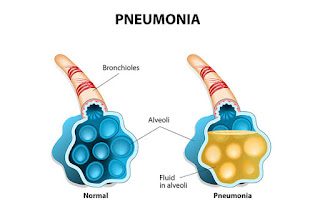Pneumonia: Causes and cure
Pneumonia is a lung infection that affect one or both
the lungs. The infection occurs when the air sacs in the lungs or alveoli, will
fill up with fluids or pus. It is basically characterized by inflammation of
the airspace in the lungs, due to an infection. This can make it hard to
breathe in enough of oxygen to reach the bloodstream. The infection can range
from mild to severe. It is generally more serious when it affects older adults,
infants and young children with chronic medical conditions or weak immunity.
Pneumonia
types
Classification of pneumonia is based on where or how
it was acquired by an individual. The types include- Hospital- acquired
pneumonia (HAP), Community- acquired pneumonia (CAP), Ventilator- associated
pneumonia (VAP) and Aspiration pneumonia.
Causes
of Pneumonia
Various infectious agents can cause pneumonia like:
Bacterial pneumonia-
Streptococcus pneumonia is the most
common cause of the bacterial pneumonia. Some of the causes include, Mycoplasma pneumonia, Haemophilus influenza and Legionella pneumophila.
Viral pneumonia-
Respiratory viruses like influenza or flu, respiratory syncytial virus (RSV)
and rhinoviruses are often the causes of pneumonia. This is usually milder and
can be treated within 0ne to three weeks.
Fungal pneumonia-
Pneumonia is caused from fungi of soil or bird dropping. People with weak
immune system are prone to this types of pneumonia. Few fungi that causes
pneumonia include Pneumocystis jirovecii, Cryptococcus species and Histoplasmoisis species.
Symptoms
of Pneumonia
Some of the symptoms of pneumonia include-
·
Fever
·
Sweating or chills
·
Phlegm or mucus production while coughing
·
Normal activities or even while resting
may experience shortness of breath
·
Occurrence of worst chest pain while
breathing or coughing
·
Fatigue or tiredness
·
Headaches
·
Loss of appetite
·
Nausea or vomiting
Other symptoms that that vary according to age and
health conditions are-
·
Infants show symptoms sometimes like vomiting,
lack of energy, or may have trouble eating and drinking
·
Children under the age of five years can have
fast breathing and wheezing
·
Old aged people might exhibit confusion or
a lower body temperature than normal.
Treatment for Pneumonia
Treatment method will depend on the type of pneumonia
one has, how severe it is and the general health.
·
Medicine prescription-The doctor may
prescribe a medication to treat pneumonia. The prescription will depend on the
specific cause of pneumonia.
Oral
antibiotics is an option of treatment in most cases
of bacterial pneumonia. It is advisable to always take the entire course of
antibiotics, even if you begin to feel better. In failure to do so, can prevent
the infection from clearing, and it make it harder to treat in the future.
While antibiotic medications don’t work on viruses. In
such cases, doctor may prescribe an antiviral. However, many cases of
viral pneumonia clear on their own with at-home care.
Also, antifungal medications are used to
fight fungal pneumonia. One may have to take this medication for several weeks
to clear the infection.
·
At-home care
Your doctor may also recommend over-the-counter (OTC)
medication to relieve your pain and fever, as needed. These may include: aspirin,
ibuprofen (Advil, Motrin) and acetaminophen (Tylenol). One can avail these from
e- pharmacy like 3MEDS, the best healthcare service provider in India.
The doctor may also recommend cough medicine to calm
your cough so you can rest. Keep in mind coughing helps remove fluid from your
lungs, so you don’t want to eliminate it entirely. One can recover and prevent
a recurrence by getting a lot of rest and drinking plenty of fluids.
·
Hospitalization
If hospitalized due to severe symptoms, doctors will
keep track of the heart rate, temperature, and breathing. Hospital treatment
may include: intravenous antibiotics injected into a vein, respiratory
therapy, which involves delivering specific medications directly into
the lungs or teaching you to perform breathing exercises to maximize your
oxygenation and oxygen therapy to maintain oxygen levels in your bloodstream
which is received through a nasal tube, face mask, or ventilator, depending on
severity.
Prevention
of Pneumonia
Pneumonia can be prevented by getting a vaccination.
Some of the vaccines include Prevar 13 and Pneumovax 23, Flu vaccine or Hib
vaccine. Some of the other prevention tips are quit smoking, wash hands with
soap and water regularly, cover your mouth while you sneeze or cough.
Ending
note
On the whole maintain a healthy lifestyle to strengthen
the immune system. Have enough of rest, consume balanced healthy diet and keep yourself
active by regularly exercising. The e- pharmacy of Delhi, 3MEDS, is available for your health needs.





Comments
Post a Comment